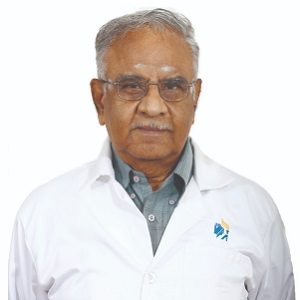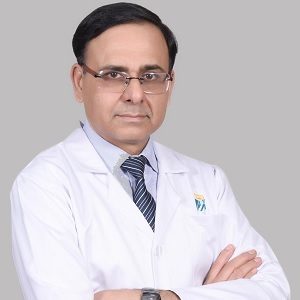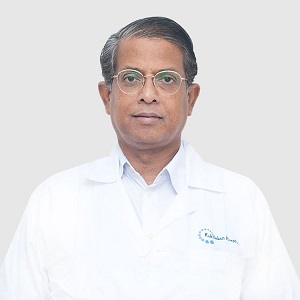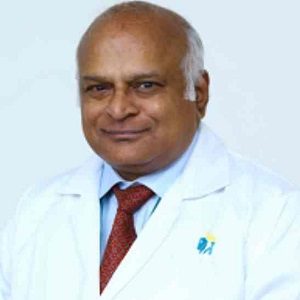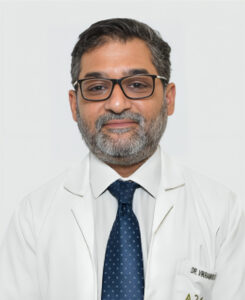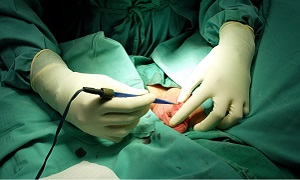Best Doctors in India for Penile Cancer Treatment
- Urologist, Chennai, India
- Over 45 years’ experience
- Apollo Hospitals Greams Road
Profile Highlights:
- Dr. Duraisamy S is one of the best Urology surgeons and General physicians in South India with more than 45 years of experience.
- Dr. Duraisamy considers his profession a special mission, a devotion that calls for involvement, respect, and willingness to help others.
- He published several papers on UTI, uterovaginal fistula, ureteric diverticulum, and Endoscopy in reputed medical periodicals.
- Top Urologist | Apollo Hospital, New Delhi, India
- 30+ Years Experience
- Indraprastha Apollo Hospital, New Delhi
Profile Highlights:
- Dr. Vipin Arora is a well-known Urologist in Delhi who has been practicing for more than 30 years with success.
- Currently, he is working as a senior consultant for Urology & Andrology at Apollo Hospital, New Delhi.
- Dr. Arora specializes in prostate diseases, Uro-Oncological surgeries, and laparoscopy procedures. He is the frontrunner in Robotically- assisted laparoscopic radical prostatectomy, Urologic oncology.
- Dr. Arora pioneered the Robotic Prostate Surgery technique in India.
- He also offers CAPD, Extracorporeal shock wave lithotripsy, Flexible Ureteroscopy, Laser treatment, Polycystic Kidneys treatment, Cadaver and Live Renal Transplant, GU prosthetics, Stress Incontinence surgery TVT TOT, and TURP.
- Top Urologist | Apollo Hospital, New Delhi, India
- 42+ Years Experience
- Indraprastha Apollo Hospital, New Delhi
Profile Highlights:
- Dr. Suresh Kuamr Rawat is one of the best Urologists in India, having a grand experience of 42 years in the field.
- His services extend into prostrate laparoscopy, TUIP, TURP, minimally invasive surgery, etc.
- Dr. Suresh Rawat is practicing as a consultant with the Department of Urology at Apollo Hospitals, New Delhi.
- Dr. Rawat specializes in neuromuscular disorders, Andrology, and complex urological surgeries. He is an expert doctor for Endourology, Uro oncology, Reconstructive Urology, Female Urology, and Pediatric Urological treatment.
- Top Urologist and Kidney Transplant Surgeon | Kokilaben Hospital, Mumbai, India
- 30+ Years Experience
- Kokilaben Dhirubhai Ambani Hospital
Profile Highlights:
- With over 30 years of experience, Dr. Bejoy Abraham has worked as a consultant at premier institutes such as CMC, Vellore, and Addenbrookes Hospital, Cambridge, UK.
- He has vast experience in kidney transplant, management of kidney stones, cancer conditions of the bladder, reconstructive urology, erectile dysfunction as well as Pediatric urology.
- Urologist, Chennai, India
- Over 39 years’ experience
- Apollo Hospitals Greams Road
Profile Highlights:
- Dr. Murali Venkatraman is a Senior Urologist from India with vast experience.
- Being a fellowship holder in Laparoscopic Urology, he specializes in Laparoscopic Urology.
- Dr. Venkataraman is serving for the last 39 years and has received many awards and recognitions for his contribution.
- Urologist, Chennai, India
- Over 37 years’ experience
- Apollo Hospitals Greams Road
Profile Highlights:
- Dr. Thirumalai Ganesan Govindasamy is a well-known Urologist of India.
- He has interests and specializations in Laparoscopic and Robotic Urology, Robotic and Laparoscopic Donor Nephrectomy, Urethral Reconstructive Surgery, Per-cutaneous Nephrolithotomy, and Flexible Ureteroscopy.
- Serving his patients for almost 37 years, Dr. Govindasamy has gained enough recognition and trust from his patients and has cured many people of severe illnesses.
- Urologist & Kidney Transplant Surgeon
- 20+ Years Experience
- Artemis Hospital, Gurgaon
Profile Highlights:
- Dr. Vikram Barua Kaushik is a highly experienced urologist with a specialized focus on organ transplantation and advanced urological procedures.
- He currently serves as the Chief of Urology, overseeing the Kidney Transplant Program and Robotic Surgery (Unit II) at Artemis Hospital in Gurugram, New Delhi.
- His clinical focus includes urinary stone disease, cancers of the genitourinary tract, prostatic disease, urinary incontinence, and neurogenic bladder dysfunction.
Best Hospitals in India for Penile Cancer Treatment
- City: New Delhi, India
Hospital Highlights:
- Equipped with 650 beds, BLK-Max Super Speciality Hospital is the largest stand-alone private sector hospital in Delhi.
- With over 1500 healthcare providers and 150 globally renowned super specialists, the hospital is one of Asia’s largest BMT Centres. The hospital is known for having some of the best cancer doctors in the country.
- The hospital is NABH and NABL accredited and was inaugurated by the first Prime Minister of India. Pt. Jawahar Lal Nehru.
- City: Hyderabad, India
Hospital Highlights:
- Located in the vibrant city of Hyderabad, Apollo Health City is a world-renowned medical facility that provides outstanding care and treatment to patients coming from different parts of the world.
- Founded in 1988, this 550-bed multispecialty hospital with 50 specialties and 12 Centres of Excellence continues to deliver outstanding outcomes for patients with the simplest to the most complicated medical conditions.
- Backed by the latest medical equipment and a dedicated team of professionals, the hospital provides comprehensive treatment across various specialties including, cardiology, critical care, neurosciences, cancer, orthopedics, gynecology, ENT, transplants, gastroenterology, etc.
- Apollo Health City is a cutting-edge healthcare facility that combines various facilities under one roof. These may include state-of-the-art physical medicine, rehabilitation, and wellness services with education, research, telemedicine, innovative medical devices, disease management programmes, and medical talents.
- The hospital is known for offering top-notch cancer treatment accompanied by cutting-edge facilities and technology.
- The hospital also offers a broad spectrum of cosmetic procedures that improve not just appearance but also comfort.
- In 2011, Apollo Health City was the recipient of the Asian Hospital Management Award (AHMA).
- In 2013, the Government of India recognized Apollo Health City as the top medical tourism destination in the country.
- City: Mumbai, India
Hospital Highlights:
- Kokilaben Dhirubhai Ambani Hospital, Named after the wife of Indian industrialist Dhirubhai Ambani, the founder of Reliance Industries, this is one of the top hospitals in Mumbai. This 750-bed multi-specialty hospital became operational in 2009. Known as one of India’s most advanced tertiary care facilities, the hospital is designed to raise India’s global standing as a healthcare hub, with an emphasis on excellence in clinical services.
- Kokilaben Dhirubhai Ambani Hospital uses Protocol and Care Pathway based treatment models to ensure the best outcomes for patients.
- The hospital represents a confluence of top-notch talent, cutting-edge technology, state-of-the-art infrastructure, and, most importantly commitment.
- The hospital also holds the accreditation of the NABH, NABL, CAP, and JCI.
- The hospital has been recognized as the No. 1 Multispecialty Hospital in Mumbai and the West Zone for the fifth year in a row in 2020 by The Week.
- City: Chennai, India
Hospital Highlights:
- Apollo Cancer Centre in Teynampet, Chennai is one of the best super speciality hospitals in India. It is the country’s first ISO-certified healthcare facility.
- Additionally, it is the first hospital in Chennai and the first oncology hospital in India to receive NABH accreditation.
- The hospital provides advanced tertiary care in oncology, orthopedics, neurology and neurosurgery, head and neck surgery, and reconstructive and plastic surgery.
- Additionally, it offers specialized healthcare of international standards with results comparable to those of the best hospitals in the world.
- It is outfitted with 300 beds, the newest and greatest technology, a large pool of highly qualified specialists, and a committed team of medical and paramedical professionals.
- It is one of the first few medical facilities in India to offer comprehensive cancer care. A team of skilled medical, surgical, and radiation oncologists makes up the Tumour Board, which is a component of the complete treatment planning system. After reviewing reported cases, the Board determines in concert with diagnostic specialists what course of action is best for each individual patient. The panel is further supported by dieticians, medical counselors, speech therapists, and other pertinent specialists.
- The hospital launched the first ExcelsiusGPS® Spine Robot in South India and has completed over 50 surgeries till date.
- It is also one of the few cancer hospitals in India to offer Cyber Knife therapy. Till now it has completed 1320 Cyber Knife therapies.
- The institution is also one of the few in India with the capacity to do transplants and find a prospective unrelated donor. The hospital has performed over 1000 BMTs till now.
- Furthermore, it has an exceptional milestone of performing exultant Micro vascular free tissue transfer and Aesthetic surgeries on more than 1000 patients with success.
- City: Chennai, India
Hospital Highlights:
- Apollo Hospitals, Chennai, is one of the best hospitals for heart care in India. Over the years, Apollo has expanded all over India, as a healthcare chain.
- India’s first ‘Only Pancreas’ transplant was performed in Apollo Hospital. The hospital is known for successfully performing Asia’s first en-bloc combined heart and liver transplant, and over the years, it has attained a remarkable achievement in the global healthcare space. Around 3-4 organ transplants are performed in the hospital per day.
- Equipped with over 500 beds, this hospital in Chennai was established in 1983 and since then has been among the most preferred hospital for patients from all over the world.
- The hospital holds accreditation of the NABH and JCI and is the first hospital in India to be ISO 9001 and ISO 14001 certified. It is also the first South Indian Hospital to receive subsequent reaccreditation from the JCI USA 4 times.
- City: Chennai, India
Hospital Highlights:
- Established in 1999, Gleneagles Global Hospital, Chennai, is one of the top healthcare facilities in Southern India. It is part of the Gleneagles Hospital Chain, which is the fourth largest healthcare chain in the country. The hospital specializes in multi-organ transplants of kidneys, liver, lungs, heart, etc.
- The hospital has an excellent infrastructure and state-of-the-art lab and equipment set-up. The hospital boasts cutting-edge technologies, a highly skilled team of doctors and surgeons, and trained support staff. Located in Perumbakam, Chennai, it is one of India’s premier health care destinations. The hospital has performed some of the most complex surgical and clinical procedures in India including multi-organ transplantations.
- The hospital’s lung transplantation program is one of the best in the country. The hospital is known for having performed India’s first single lung transplant and first minimal invasive lung transplant. It is also the only Indian hospital to be associated with King’s College Hospital, London, United Kingdom for liver transplantations.
- City: Hyderabad, India
Hospital Highlights:
- KIMS Hospital (a brand name of Krishna Institute of Medical Sciences) is one of the largest and best multi-speciality hospitals in Hyderabad. The hospital provides various treatments to an enormous number of patients.
- The hospital has a capacity of more than 3000 beds. KIMS Hospitals offers different healthcare services in more than 25 specialities and super specialities.
- The hospital is equipped with modern medical equipment and technology. It has robotic equipment to provide minimal invasive techniques for patients.
- The hospital is aimed at providing world-class healthcare facilities and services at an affordable cost for patients.
- The various specialities and departments of the hospital include neurosciences, gastroenterology & hepatology, robotic science, reproductive sciences, dental science, oncological sciences, organ transplantation, heart and lung transplantation and mother and child care.
- City: Kolkata, India
Hospital Highlights:
- Established in 2003, Apollo Gleneagles Hospitals is a 750-bed multispecialty tertiary care hospital situated in Kolkata.
- With 33 Centres of Excellence and more than 50 specialties, Apollo Gleneagles Hospitals, Kolkata is capable of handling all sorts of patients.
- This tertiary care hospital, which is a 100% subsidiary of Apollo Hospitals Enterprise Ltd., India, is regarded as one of Kolkata’s top hospitals.
- The facility is a complete blend of cutting-edge technology, state-of-the-art infrastructure, and genuine hospitality.
- Focusing on numerous specialties, the hospital provides all-inclusive medical treatments supported by cutting-edge technology and a staff of highly qualified medical specialists.
- Patients across the globe come to Apollo Gleneagles Hospitals Kolkata for their treatment. Moreover, international patients receive full attention and assistance for their treatment and are provided with a hassle free experience.
- Apollo Gleneagles Hospitals, Kolkata is the only hospital in Eastern India to hold the Joint Commission International (JCI) certificate.
- It is also the only hospital in Kolkata to hold the NABL accreditation in six different categories, which includes Clinical Biochemistry, Clinical Pathology, Hematology & Immunohematology, Microbiology & Serology, and Histopathology & Cytopathology.
- Furthermore, Apollo Gleneagles Hospitals, Kolkata is known for performing the first ever Reverse Shoulder Prosthesis Replacement in East India.
- City: Bengaluru, India
Hospital Highlights:
- Established in 1991, Manipal Hospital, Old Airport Road, Bangalore is the flagship facility of the Manipal Hospitals Group, which is one of the largest networks of Multispecialty Private Hospitals in India.
- The facility is well-known for its state-of-the-art technology, performance-driven, patient-centric, and evidence-based approach.
- The facilities offered at Manipal Hospital meet the highest international standards, allowing the hospital to attract a large number of national and international patients.
- Their expertise encompasses the diagnosis and treatment of a wide range of diseases in several specializations that address both simple as well as complex medical procedures.
- There are total 600 beds accessible in the hospital for the in-patients so they may heal while being closely watched after by the medical team. In addition, it has 144 critical care units, including NICUs, ICCUs, and ICUs. Apart from that, the hospital also offers 20 contemporary, modular state-of-the-art operating rooms with all the amenities needed.
- The hospital has several departments that are overseen by highly skilled, certified, and experienced medical experts.
- One of the best departments in the hospital is that of the Cancer department which is known for its advanced cancer diagnosis and treatment facilities such as Intracavitary Chemotherapy, Biological Therapy, HIPEC, PIPEC, Nuclear Medicine, Radiation Therapy, etc.
- It is one of the few hospitals in Bangalore that provides full range of pediatric services, including pediatric emergency services, pediatric gastroenterology, pediatric neurology, pediatric cardiology, pediatric orthopaedics, pediatric allergies, pediatric immunology, and infectious diseases.
- Furthermore, Manipal Hospital, Old Airport Road, Bangalore is also regarded as one of the best hospitals for bone and spine related disorders.
- City: Mumbai, India
Hospital Highlights:
- Established in 2016, Apollo Hospitals, Navi Mumbai is one of Maharashtra’s most advanced multispecialty hospital. This 500-bed hospital provides sophisticated treatments and integrated super specialty services under one roof.
- The hospital features a cutting-edge infrastructure that houses 13 state-of-the-art operating rooms, advanced laboratory and medical diagnostics, and 120 ultra-modern I.C.U. beds, including N.I.C.U. and P.I.C.U., monitored round the clock by critical care specialists.
- With 57 specialties and subspecialties, the hospital boasts a team of renowned medical specialists who offer accurate diagnosis and treatment with easy accessibility to their patients.
- Additionally, the hospital offers highly customized, individualized health check programs that are made to fit each person’s needs in terms of lifestyle.
- Apollo Hospitals, Navi Mumbai has been accredited by both the National Accreditation Board for Hospitals and Healthcare Providers (NABH) and the Joint Commission International (JCI).
- Apollo Hospitals Navi Mumbai has been awarded the “Best Practices-International Services Award” at the annual awards for service excellence and operations excellence.
Penile Cancer
Penile Cancer is a relatively rare form of cancer, which is known to affect the skin and tissue of the penis. This condition occurs when healthy cells in the penis turn cancerous and grow out of control, forming a tumor. The cancer might spread to other areas of the body as well, including the glands, other organs, and lymph nodes.
Symptoms
It is better if penile cancer is detected earlier, as if found early, there is a good chance that there is going to be a successful treatment and cure. However, if the diagnosis is delayed, then the disease may get worse. Treatment for more advanced cancer might also be less successful and at the same time, more disfiguring.
People generally spot the disease early as they see and touch the penis while urinating. Men who are not circumcised are generally at a greater risk of penile cancer, though every man should be on the lookout for penile lesions.
If you notice any of these symptoms on your foreskin, or your shaft, or the head of the penis, then you should inform your healthcare provider. The symptoms include:
- An area of your skin becoming thicker or/and changing color
- A reddish, velvety rash
- An ulcer (sore) that may bleed
- A lump on the penis
- Small, crusty bumps
- A smelly discharge under your foreskin
- Flat, bluish-brown growths
- Swelling
Sometimes these signs might just be a bacterial or fungal infection or even an allergic reaction. All of these respond to antifungal or antibacterial ointments or creams. However, if any of these growths return or there are sores that don’t heal, then you must treat them as cancer until it is proven that they are not.
Penile cancer is generally ignored until it is advanced since most patients might feel reluctant or embarrassed to talk about their genitals. Sometimes patients might also feel afraid of treatment or surgery on their private parts. However, if you notice these signs please make sure, you let your health care provider know about it as soon as you can.
Causes & risk factors
Though the exact cause is not known, body fluids that get trapped in the foreskin are believed to cause penile tumors, and if they aren’t washed away routinely, they can lead to cancer-causing effects. Older men who are smokers are generally more likely to get penile cancer. Conditions such as AIDS can also lead to penile cancer.
Men who maintain proper hygiene, as well as men who are circumcised, are generally less likely to get penile cancer.
Some of the risk factors include:
- Being over the age of 60
- Practicing poor personal hygiene
- Living in a region with poor and improper sanitation and hygiene practices
- Smoking cigarettes
- Having a sexually transmitted infection, such as human papillomavirus (HPV).
Diagnosis
Physical exam
To perform a diagnosis, your doctor will need to perform a physical exam and use certain diagnostic tests as well. During the physical exam, your doctor will need to look at your penis, and inspect any lumps, masses, or sores present.
Biopsy
Cystoscopy
If the biopsy results show any sign of cancer, then your doctor might want to perform a cystoscopy to check if cancer has spread. This procedure involves using an instrument called a cystoscope, which is equipped with a small camera and light at the end.
During the procedure, the doctor is going to insert the cystoscope into the penis opening and through the bladder. This is going to allow your doctor to view different areas of your penis as well as the surrounding structures, making it possible to determine whether cancer has spread or not.
MRI
Sometimes an MRI of the penis might also be conducted to ensure that cancer hasn’t invaded any deeper tissues of the penis.
Treatment
If the cancer is detected early, it can be treated with success and low risk. If the tumor is at the top of the skin, it might be treatable with just skin cream. However, the cream has a few side effects. For small lesions, external beam radiation is also used.
Some of the other main forms of treatment include-
Circumcision
Chemotherapy
Laser therapy
Radiation therapy
Cryosurgery
Surgery
The above methods are used if the penile cancer is non-invasive. Surgery might be required if the cancer is invasive. It might involve removal of the tumor, entire penis, or lymph nodes in the pelvis and groin.
The surgery can be of various types-
Excisional surgery
Moh’s surgery
Partial Penectomy
Regardless of which type of surgery was performed, make sure to follow up with your doctor every two to four months during the first year after the surgery. If the entire penis is removed, you can talk to your doctor if penis reconstructive surgery is an option.
Your post-treatment experience generally depends on the stage of cancer when it was found. When the lesions are found early, then curing the cancer is almost certain. As the tumor becomes more advanced, then the cure becomes less certain.
If the cancer is found later, then the treatment might cause surgical side effects that might be difficult to deal with.

